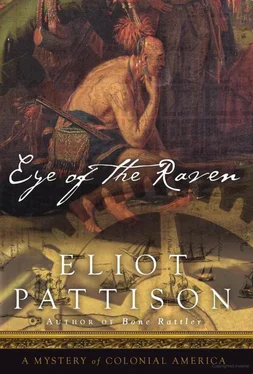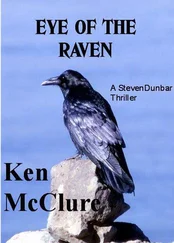Eliot Pattison - Eye of the Raven
Здесь есть возможность читать онлайн «Eliot Pattison - Eye of the Raven» весь текст электронной книги совершенно бесплатно (целиком полную версию без сокращений). В некоторых случаях можно слушать аудио, скачать через торрент в формате fb2 и присутствует краткое содержание. Год выпуска: 2010, ISBN: 2010, Издательство: Counterpoint Press, Жанр: Исторический детектив, на английском языке. Описание произведения, (предисловие) а так же отзывы посетителей доступны на портале библиотеки ЛибКат.
- Название:Eye of the Raven
- Автор:
- Издательство:Counterpoint Press
- Жанр:
- Год:2010
- ISBN:9781582437019
- Рейтинг книги:5 / 5. Голосов: 1
-
Избранное:Добавить в избранное
- Отзывы:
-
Ваша оценка:
- 100
- 1
- 2
- 3
- 4
- 5
Eye of the Raven: краткое содержание, описание и аннотация
Предлагаем к чтению аннотацию, описание, краткое содержание или предисловие (зависит от того, что написал сам автор книги «Eye of the Raven»). Если вы не нашли необходимую информацию о книге — напишите в комментариях, мы постараемся отыскать её.
Eye of the Raven — читать онлайн бесплатно полную книгу (весь текст) целиком
Ниже представлен текст книги, разбитый по страницам. Система сохранения места последней прочитанной страницы, позволяет с удобством читать онлайн бесплатно книгу «Eye of the Raven», без необходимости каждый раз заново искать на чём Вы остановились. Поставьте закладку, и сможете в любой момент перейти на страницу, на которой закончили чтение.
Интервал:
Закладка:
"They say," Duncan declared as he slipped into a chair beside the man, "that ours is a new fraternity of mercenaries."
The man turned with a dull, resentful look, then Duncan lifted the hair at his temple to expose the long, ragged scar along his scalp.
"God's breath!" the man gasped, jerking Duncan's hand down. "Have you no sense! The mark of the savage is like the mark of the devil to these city folk."
"Then you are not of the city?"
The man answered cautiously, all signs of drunkenness gone. "Bethlehem, in the north."
Duncan knew it only by reputation. "The Moravian town?"
"Ja. But here I take my education," the stranger offered in a hollow voice.
"As a surveyor?"
The man nodded. "I am an excellent surveyor. Though I fear I lost my equipment in the wilds."
"Along with your ear?"
The German winked. "I expect it's now being worn on some savage's necklace. My father declared it was a sign I should return to mission work. Missionaries be protected by God."
"I hear surveyors are needed for the Virginian claim in the west."
"I hear," the man shot back, "they require as many grave diggers as surveyors." He accepted an apple from a servant girl who wandered among the patrons with a basket of the fruit. Duncan sipped from his tankard as the man unfolded a pocketknife and cut the fruit into wedges.
"Suppose a man were desperate enough," Duncan said. "Who would he see?"
The Moravian pushed an apple slice toward Duncan and ate one himself as he studied the crowd. "There is a tobacco merchant who sells Virginia leaf and pipes to smoke it, a Potomac man."
"How many has he hired?"
"Half a dozen perhaps."
Were there men still out there, Duncan wondered, unknowingly proceeding toward their deaths? "How long since-" his words died in his throat. The men playing with the ball had stopped, had taken off their hats, and were standing at the corner counter where drinks were dispensed. A familiar figure stood at the front of the group, staring directly at Duncan now. The notices declaring a bounty on Duncan would be meaningless to the residents of the city since they would not know Duncan's appearance. But Samuel Felton, the magistrate's nephew, knew his face. One word from Felton and every man in the room would turn on Duncan.
The lanky Quaker caught the eye of first one, then another of his group, both broad-shouldered beefy men with the sunburned faces of those who worked the river boats. Conawago was on his feet now, his hand instinctively going to his belt, where his war ax usually hung. But they had left their weapons at the stable. They had no weapons, only the barest acquaintance with the alleys and streets outside the door. Eyes began drifting toward Conawago, who had lifted a heavy stick from the hearth, bracing for a fight.
Suddenly the door of the inn burst open and a dark-hooded figure appeared silhouetted by the light of the street lanterns behind him. A murmur of recognition rippled through several of those present, and they began to back away as the cloaked man, carrying a large wooden box, took several steps inside. The shapeless garment he wore extended nearly to the floor, its hood obscuring his face.
`Ave caesar!Morituri to salutamus!" the mysterious figure called in a ragged voice. Impossibly, he was speaking Latin. `Ecce ignis! Ecce ignis!" he repeated. Duncan stood, inching toward the door as he watched not the stranger but the crowd, frantically trying to see where Felton had gone. He looked back at the intruder in confusion. Hail Caesar, he had called in Latin, we who are about to die salute you, the call of the gladiators, then behold the fire. The men who had backed away had stopped as if they sought only a safe distance. The proprietor watched from his corner with an expectant, almost amused expression.
The same Latin words were repeated, rising in volume to a crescendo. A drunk at a table near the front threw a heel of bread. With a quick, deft motion, the stranger opened the hinged lid of his box, produced something like a wand with a metal ball at the end, and aimed it at the drunkard, extending it to within inches of the man's face.
A bolt of lightning leapt out and struck the offender's nose.
The room erupted into chaos. The man who had been struck screamed, tumbled off his chair, and crawled under the table, whining in terror. His companions leapt up and fled to the far side of the room. Except for Conawago and Duncan, the half of the room nearest the door was emptied. The stranger turned his contraption toward Duncan for a moment, muttering, Apage!" with a short, quick gesture toward the street before stepping closer to the crowd. Begone! Several onlookers began crossing themselves, one even lifted a cross from his neck and extended it in front of him.
"Tanta stultitia mortalium est." the cloaked figure cried, making a jerking motion toward another drunkard, who promptly fainted. What fools these mortals be. One fearful spectator swung a poker from the fireplace at the stranger, who aimed another bolt of lightning at him. The lightning hit the iron poker, and the man yelped in pain, dropping it to the floor. From the rear came hoots of amusement, from those closer more fearful prayers.
Duncan turned and darted out the door.
CHAPTER TWELVE
He did not know what direction he took through the darkened streets, did not care, only became aware of Conawago passing him. Minutes later they stopped, gasping, the river wharves with their ranks of ships looming on one side, a hulking building on the other, with a row of low wooden structures like cages along its rear wall.
"Where are you-" Duncan began as Conawago tested the latch on the building's back entry. A snarl erupted from one of the cages.
His friend cut him off with an upraised hand as the door opened under his touch. "Let us not disturb the neighborhood when safety is so near at hand," he warned, and he stepped inside.
Where they were, he now realized, was the warehouse with the Iroquois markings on the front door.
They moved through a large chamber that seemed part kitchen, part workshop, into a hallway that connected the front and rear of the building, then settled onto the floor near a patch of moonlight. His eyes shifting from the rear door to the front entry, just visible beyond the shadows, Duncan relayed his conversation with the Moravian surveyor in the tavern. As he finished, the latch of the front door rattled. A solitary man entered, laughing to himself, whimsically reciting the Latin words Duncan had heard in the tavern as he set a large box on the table by the entry.
They warily rose, retreating back into the shadows as the stranger lit a candle before stepping into the hallway. Duncan touched the knife he kept at his waist, his only weapon.
The stranger did not seem surprised to see them. "Excellent!" he exclaimed. "Veni vidi vici!" he concluded cheerfully. "They know not what a gift it is," he added as he pushed back the hood of his cloak, "to have the channels of their brains reenergized." He handed the candlestick to Conawago, leading them to a door in the middle of the hall before gesturing them to wait as he trotted to lock the rear door. Lighting a second candle from the first, he opened the door and led them up a steep, winding staircase that took them into a spacious chamber, where their host began lighting several oil lamps.
"Dr. Henry Marston," he announced with outstretched hand.
Duncan did not immediately respond. He gazed in confusion at one of the oddest chambers he had ever seen. The long troughs, designed for feeding livestock, that lined the two sidewalls were filled with salt. In the center of the room was a large, bizarre device of wood and glass. Along the front wall, behind a heavy wooden chair whose arms held straps for restraining its occupant, was a long table on which sat several large glass jars pierced through the top by metal rods. What appeared to be a brass ball hovering over their heads proved on closer examination to be connected to a long brass rod extending up through the ceiling. Duncan recalled the metal spears on the roof. On two smaller tables were an array of glass containers, strips of metal, and discs of what appeared to be hardened tree resin.
Читать дальшеИнтервал:
Закладка:
Похожие книги на «Eye of the Raven»
Представляем Вашему вниманию похожие книги на «Eye of the Raven» списком для выбора. Мы отобрали схожую по названию и смыслу литературу в надежде предоставить читателям больше вариантов отыскать новые, интересные, ещё непрочитанные произведения.
Обсуждение, отзывы о книге «Eye of the Raven» и просто собственные мнения читателей. Оставьте ваши комментарии, напишите, что Вы думаете о произведении, его смысле или главных героях. Укажите что конкретно понравилось, а что нет, и почему Вы так считаете.












